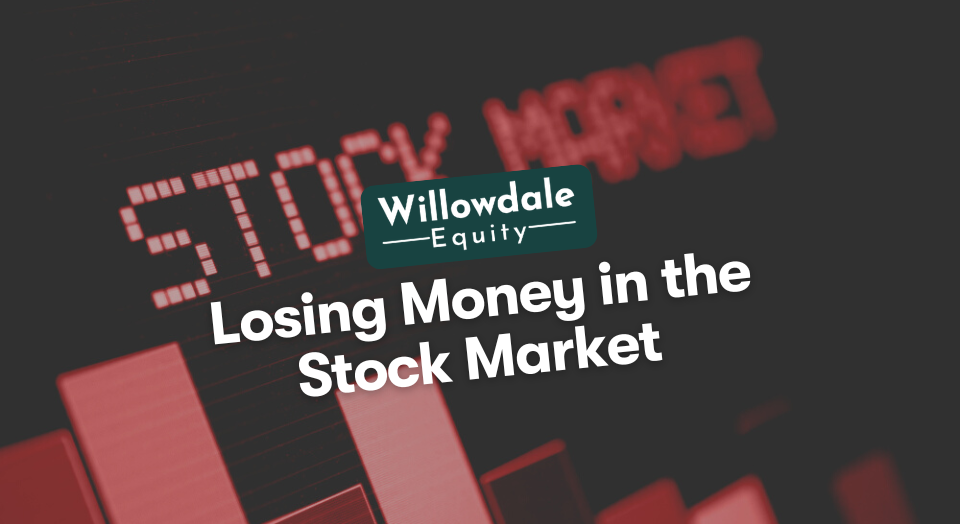
Losing Money in the Stock Market & Why it’s Time to Seek Yield Elsewhere
This article is part of our guide on how to invest 1 million dollars for income, available here.
The bear market is hitting everyday investors hard right now. The move into bear market territory and widespread fear of a market crash are removing the wishful thinking about the potential for passive income from stocks. What’s next if you want to diversify your investment objectives away from public stocks and other securities? Look at where intelligent investors are moving their money to avoid the stock snare.
Key Takeaways
-
All investments are subject to market risk, but some investment categories that are less volatile than stocks.
-
Private real estate syndications and private equity funds are two safe harbors attracting many investors today. These options are appealing because the value is assessed based on actual tangible value and cash flow instead of speculation.
Why Do Investors Start Their Investing Journey’s in the Public Markets and End Up in The Private Markets?
The simple answer is that investors with little experience do better once they know better. Most investors start investing in public markets using stocks because this is a highly accessible option. Anyone can simply create a brokerage account on an online trading platform and begin to purchase securities. A combination of high liquidity, low investment minimums, and low barriers to entry can make investing in stocks feel like an exciting way to start earning passive income.
Those perks are also reasons why investing in stocks is rarely enough to get everyday investors to their goals. Think of how rare it is to meet anyone who simply lives on their stocks who wasn’t already a millionaire from some other source before investing. Even mature investors who do make high incomes from stocks tend to pivot to better investments that provide them with more consistent returns.
The two hot spots for these investors are real estate and private business investments. Next, take a look at all-too-common traps that cause so many people to become market losers.
How do People Lose Money in the Stock Market?

There are three common ways a bad investment strategy can cause you to take a loss on an individual stock. The sharpest cut usually comes from capital losses. With a capital loss, a person watches the price of a stock go down without rebounding after purchasing that stock. The investor eventually decides to sell stocks just to stop the bleeding. It’s considered a “capital loss” any time capital is lost because the price that the capital asset is sold for is lower than its purchase cost. This frequently happens in bear markets.
The next loss comes from missed profit. Common with volatile stocks, a profit loss occurs when you watch a stock make a huge run-up before tumbling back. This is an easy trap for investors because calling the top or bottom of a stock is very difficult.
Next, opportunity losses happen when stocks stay stagnant. While you didn’t technically lose anything, you kept money tied up in a stock that is parked in the same spot a year later instead of investing in more vivacious stocks. Even putting what you paid for the stock in a high-interest account probably would have earned more. Next, it’s time to talk about better places to put your money to guarantee passive income instead of risking losses.
I Keep Losing Money in the Stock Market, Where Should I Invest Instead?
All investments are subject to market risk, but let’s turn our attention to some investment categories that are less volatile than stocks. Private real estate syndications and private equity funds are two safe harbors attracting many investors today. These options are appealing because the value is assessed based on actual tangible value and cash flow instead of speculation.
Yes, both real estate and private equity funds are subject to some speculation. However, investors generally have reliable historical data when investing in these categories. A deeper dive into real estate syndications and private equity funds is up next.
Private Real Estate Syndications
Real estate syndications let investors access the benefits of cash flow, tax shelter, and appreciation that go along with owning an investment property without the effort and stress of being a landlord. What is a real estate syndication? Syndications are made up of groups of investors who pool capital together to purchase real estate. Specific investment assets jointly owned by a syndication can include apartment buildings, self-storage units, retail spaces, commercial spaces, mobile home parks, land, and more. The general partners in a real estate syndication are responsible for all structuring and operating. This often includes:
- Deal underwriting.
- Performing due diligence on properties.
- Negotiating with sellers.
- Arranging financing.
- Creating a business plan.
- Sourcing investors.
- Raising capital for property purchases.
- Managing operations at properties.
- Managing properties as assets.
- Managing investor relations.
Investors earn either monthly or quarterly passive income distributions without the challenges of managing properties and tenants. These payouts increase when a property’s value does!
The K-1 tax benefit for owning a chunk of real estate also transfers to individual syndication investors. Next, it’s time to cover private equity funds.
Private Equity Funds
A private equity fund is considered an alternative investment that generates revenue by investing in private companies that aren’t listed on a public stock exchange. Companies use private equity funding to obtain funding using “venture capital” instead of utilizing traditional bank financing.
The capital infused into these companies by investors is used to make acquisitions, strengthen a balance sheet, fund new technology, or expand usable capital. Investments are made by individuals using a fund of funds (FOF), an exchange-traded fund (ETF), or a special purpose acquisition company (SPAC). Private equity funds require substantial investments for extended periods compared to private real estate syndications. While every investment comes with some risk, the next section explains ways to protect your downside.
Lost Money on Investments? Things you can do to try and Protect Your Downside

While all investing involves risk, it can be less risky if you stick to certain investment values as you navigate investment opportunities. Impulsivity, human emotion, and overexposure can all contribute to losses. Keep them in check with these tips.
1.) Don't Sell on Fear
The market smells your fear. Panic selling on stock declines is one of the easiest ways to lose income opportunities. When investing in stocks or equity funds, it’s important to only put money forward if you’re interested in the long game. Get comfortable with the idea of watching stock prices ebb and flow without acting. Of course, the next tip is equally important.
2.) Don't Buy on Excitement
It’s common to feel compelled to buy when a company made 11% gains yesterday. The fact is that the human brain lights up at the sign of upward patterns. However, excitement buying may cause you to put too many eggs in one basket when there’s no guarantee that a stock will continue to gain.
While buying something on its way up is fine, it’s also essential to have a complete picture of the stock’s value before deciding based solely on the assumption that what goes up will continue to go up. Of course, the next tip can help you to take some of the burdens of sorting through mountains of investment advice and “picking winners” off your shoulders.
3.) Enjoy Safety in Numbers
Real estate syndications are becoming preferred among mature investors because they remove many wildcards from the investing process by presenting investors with pre-vetted, money-making properties that spread the burden and risk among a large pool of investors. Regarded as one of the safest investment vehicles with the highest returns, investors seek a stable investment option like syndications because they are often viewed as inflation-proof investments simply because rents rise with inflation. It’s now time for a roundup on how not to lose money when making your next investment.
How to NOT Lose Money On Your Next Investment
Go into the situation educated. Understanding the risk level when making any kind of investment is essential. Trying to rely solely on stocks is difficult because knowing exactly when to buy and sell can be nearly impossible.
When you’re only relying on stocks instead of making stocks part of a well-rounded plan for bringing in passive income streams, you’re subject to the whims of the market. You can also devote all of your attention to the market to stay ahead of the trends.
The solution? Zoom out your investments on your investment time horizon to ensure you’re investing in assets with long-term solid demand. It’s important that what you’re investing in can keep pace with inflation. This is why real estate syndications are increasingly becoming the preferred “safety nets” of experienced investors and personal finance advisors. Read ahead to get answers to common questions about taking losses in the stock market.
Frequently Asked Questions About Losing Money in the Stock Market
People who lose money trading tend to make the wrong investments entirely, buy stocks at the wrong time, or miss opportunities to make money by selling stocks at the wrong time.
Yes, it’s possible to lose every penny you invest in stocks. Any company can lose all of its value until stock values become zero.
How do People Lose Money in the Stock Market - Conclusion
Losing money in stock market investments can occur from both poor investments and poorly timed investments. The most obvious way to lose money is to purchase a stock that declines after you purchase it. The second way people lose money is by missing opportunities to buy new stocks because their money is tied up in stagnant stocks.
Don’t beat yourself up if you’ve lost money in stocks. Even the most popular stock analysts are notoriously bad at predicting stock performance. That’s why turning in your crystal ball for a more stable, consistent investment might be the better option. The real truth is that people lose money in the stock market by only investing in the stock market.
Diversifying your wealth management strategy by investing in inflation-proof investments is the way around this. Join the investor club here at Willowdale Equity to get access to our resources and exclusive private multifamily investment opportunities to start building passive income.
Sources:
- Bloomberg, “Rents in US Rise at Fastest Pace Since 1986, Buoying Inflation”
- Investopedia, “Fund of Funds (FOF)”
The Willowdale Equity Investment Club is a private group of investors that are looking to passively grow their capital and share in all the tax benefits through multifamily real estate investments.






